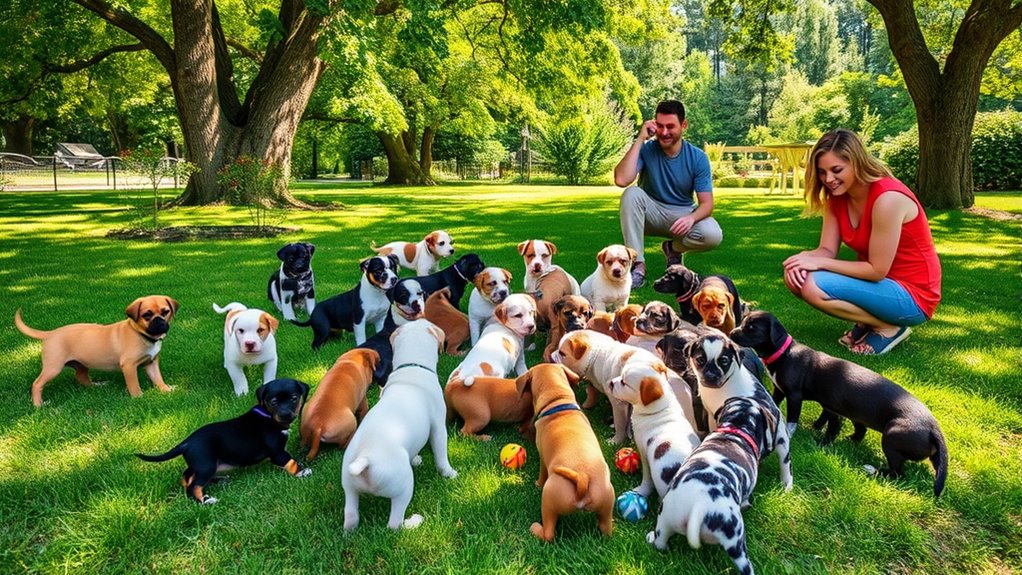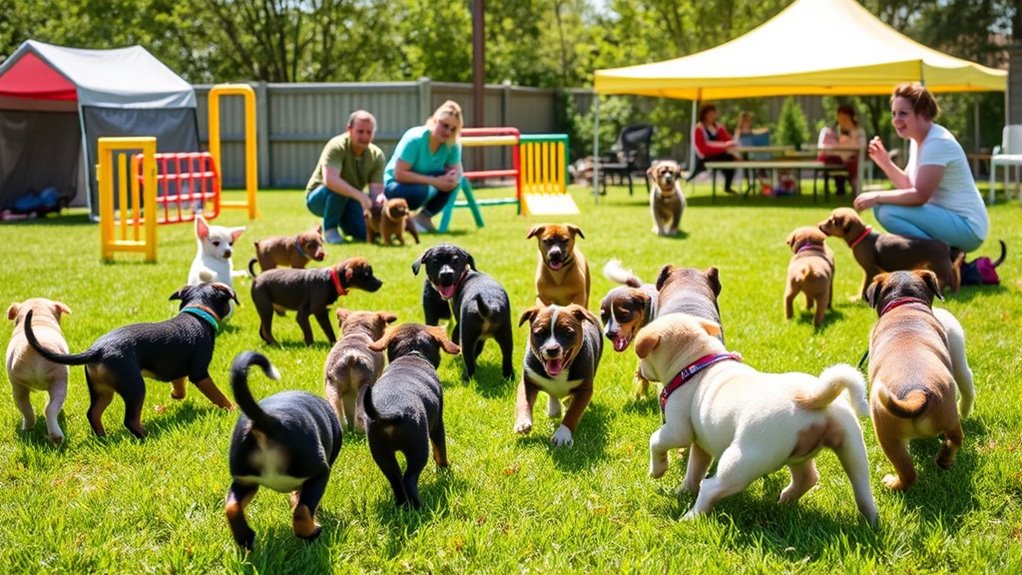When choosing a puppy school, look for a clean, well-organized environment with enough space for your pup to move comfortably. Find a program that emphasizes positive reinforcement and socialization, helping your pup gain confidence around new people and dogs. Check that the trainer is experienced, patient, and clear in their instructions. Select a schedule that fits your lifestyle and guarantees your pup receives proper individual attention. Keep exploring to discover more tips for making the best choice.
Key Takeaways
- Verify the trainer’s expertise and positive, patient communication style.
- Ensure the environment is clean, safe, and well-organized with enough space.
- Check that the curriculum covers essential commands and socialization activities.
- Confirm small class sizes for individual attention and proper socialization.
- Choose a program that fosters confidence, good behavior, and long-term dog development.

Starting your puppy’s training journey is an exciting step, but choosing the right puppy school is essential for setting a strong foundation. The training techniques used in the class will shape your puppy’s behavior and attitude, so it’s crucial to find a program that aligns with your goals and your puppy’s needs. Look for a school that emphasizes positive reinforcement methods, as these encourage good behavior without fear or punishment. Schools that incorporate reward-based techniques, like treats, praise, and play, tend to produce happier, more confident dogs who enjoy learning.
Choose a puppy school that uses positive reinforcement to build confidence and good behavior.
Equally important is evaluating the class environments. You want a setting that’s clean, safe, and well-organized, with enough space for your puppy to move around comfortably. The environment should be free of overwhelming noise or distractions that could stress your puppy or hinder their focus. A good class will have a manageable student-to-teacher ratio, so your puppy receives individual attention and the trainer can address specific needs. Observe how the trainer interacts with the puppies and their owners; a knowledgeable instructor will be patient, encouraging, and clear in their communication.
When visiting potential puppy schools, ask about their approach to socialization. Proper socialization groups are vital for helping your puppy develop confidence around other dogs and people. The best programs introduce puppies gradually to different environments, people, and other puppies, ensuring that they learn to navigate the world calmly and politely. Check whether the class is structured to promote positive interactions and whether the trainer monitors puppy play to prevent rough behavior or bullying.
Another aspect to consider is the curriculum. A comprehensive puppy class should cover basic commands like sit, stay, come, and leash manners, along with housebreaking tips and handling exercises. Some schools incorporate fun activities that build your puppy’s confidence and strengthen your bond. Additionally, understanding the importance of credit card security and secure payment processing can be beneficial if enrolling through online platforms. Make sure the class schedule fits your availability and that the duration is appropriate for your puppy’s age and attention span.
Finally, trust your instincts. Choose a puppy school where you feel comfortable and confident in the trainer’s expertise. The right environment, coupled with effective training techniques, lays the groundwork for a well-behaved and happy dog. Investing time in selecting the right class now will pay off in the long run, helping your puppy grow into a balanced and well-socialized companion.
Frequently Asked Questions
What Certifications Should a Reputable Puppy School Have?
You should look for a puppy school with trainers who have proper qualifications, like certifications in animal behavior or training. Accreditation standards from reputable organizations guarantee the school adheres to high safety and teaching practices. Verify that the trainers are experienced and certified by recognized bodies, such as the Association of Professional Dog Trainers (APDT) or the International Association of Canine Professionals (IACP). These credentials assure you’re choosing a trustworthy, well-qualified puppy school.
How Early Can My Puppy Start Training Classes?
You can start training classes when your puppy is around 8 weeks old, as long as they’re developmentally ready and have received their initial vaccinations. At this puppy age, they’re usually enthusiastic to learn and socialize. Keep sessions short and positive to match their attention span. Early training helps with socialization and builds a strong foundation for good behavior, setting your puppy up for success as they grow.
Are Group Classes Suitable for All Puppy Breeds?
Group classes can suit many puppy breeds, but breed suitability and your puppy’s temperament matter most. If your puppy is shy or easily overwhelmed, socialization groups might be stressful. Conversely, outgoing breeds often thrive in group settings. Consider your puppy’s personality and breed traits when choosing classes. Always observe the class environment first, ensuring it’s positive and supportive, so your puppy feels comfortable and can benefit from socialization.
What Is the Typical Cost of Puppy Socialization Groups?
The typical cost of puppy socialization groups ranges from $10 to $50 per session, depending on your location and the amenities offered. Don’t forget, your pup needs up-to-date vaccinations before joining, and group class scheduling often varies—some meet weekly, others bi-weekly. So, prepare your wallet and calendar accordingly, because socialization isn’t just fun—it’s an investment in your puppy’s future (and your sanity).
How Do I Handle Aggressive or Overly Shy Puppies in Class?
When handling aggressive or overly shy puppies in class, observe their puppy temperaments closely. Gently handle nervousness by giving these pups space and avoiding forced interactions. Use positive reinforcement to encourage confidence and reward calm behavior. Stay patient and calm yourself, as your demeanor influences the puppy. Gradually introduce social situations, respecting each puppy’s comfort level, and work with trainers to tailor approaches that help them build trust and reduce aggression or shyness.
Conclusion
So, after all that fuss about choosing the perfect puppy school, you might think you’ve got it all figured out. Turns out, the real lesson is just trusting your gut—and maybe not obsessing over every tiny detail. Because in the end, your pup’s social skills will shine, even if your choice of class isn’t perfect. Who knew that a little bit of patience and a good sense of humor could turn any puppy class into a success story?










